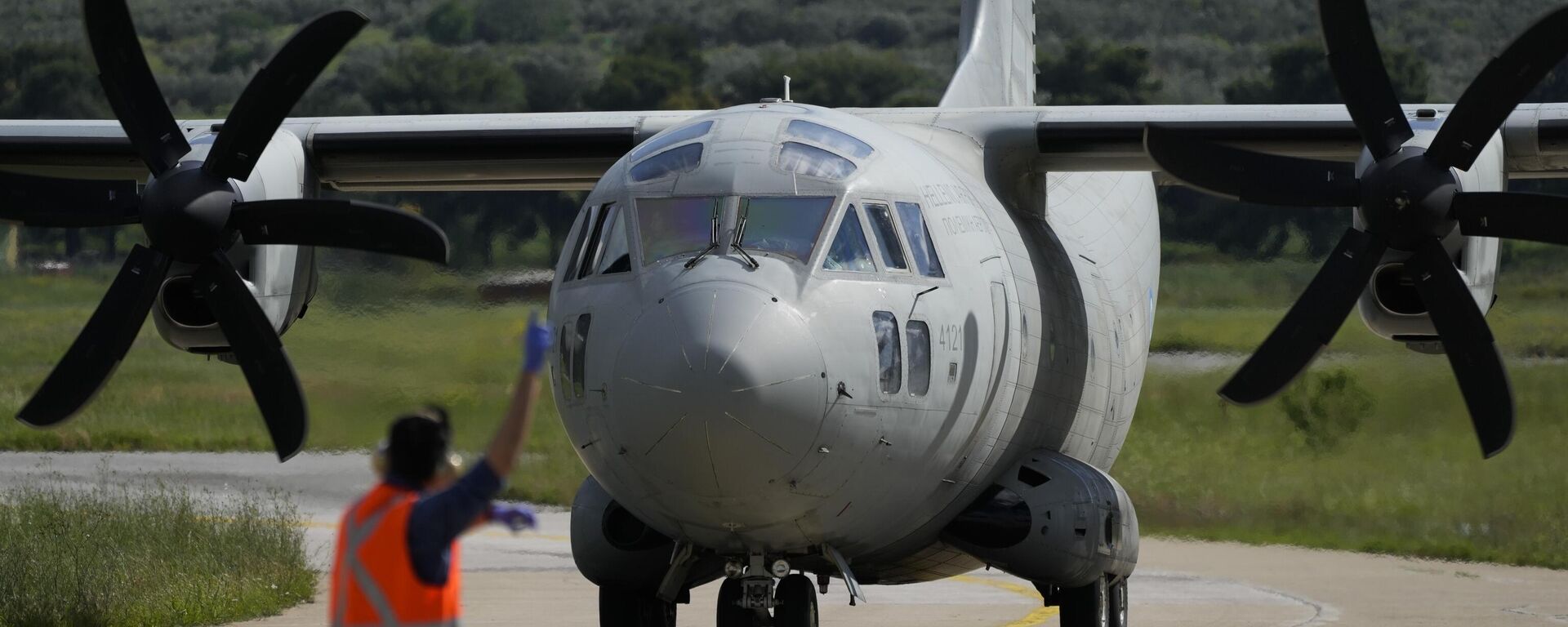https://en.sputniknews.africa/20230713/leaders-of-ethiopia-and-egypt-discuss-crisis-in-sudan-disputed-blue-nile-dam-1060501009.html
Leaders of Ethiopia and Egypt Discuss Crisis in Sudan, Disputed Blue Nile Dam
Leaders of Ethiopia and Egypt Discuss Crisis in Sudan, Disputed Blue Nile Dam
Sputnik Africa
Fighting broke out between Sudan's regular armed forces and the paramilitary Rapid Support Forces (RSF) on April 15, with the capital Khartoum serving as its... 13.07.2023, Sputnik Africa
2023-07-13T12:17+0200
2023-07-13T12:17+0200
2023-07-13T12:17+0200
armed clashes in sudan
north africa
egypt
ethiopia
clashes
conflict
negotiations
abdel fattah el-sisi
abiy ahmed
sudan
https://cdn1.img.sputniknews.africa/img/07e7/07/0d/1060503024_0:145:2777:1707_1920x0_80_0_0_d99b2eee2cd5df8decf1d723870f558e.jpg
The Sudanese conflict, bilateral relations, and Ethiopia's Blue Nile (also known as the Grand Ethiopian Renaissance Dam) were discussed by Ethiopian Prime Minister Abiy Ahmed and Egypt's President Abdel Fattah al-Sisi on Wednesday, according to the Egyptian presidency. Sisi welcomed Ahmed to the presidential palace in Cairo, the presidency stated.The two leaders "discussed ways to settle the crisis in Sudan," the Egyptian president's spokesman stated prior to a wider regional conference on the Sudanese conflict, which is scheduled for July 13.Another topic for discussion between the politicians was the Ethiopia's hydroelectric project on the Blue Nile (one of the two major tributaries of the Nile river) located not far from the border with Sudan.Ethiopia has undertaken the ambitious Grand Ethiopian Renaissance Dam project on the Blue Nile, a significant waterway in the region, since 2011. The dam's main objective is to generate electricity in order to alleviate Ethiopia's energy shortage and to export electricity to nearby nations. The dam started generating energy on February 20, 2022, sending 375 MW to the grid. In August 2022, a second 375 MW turbine was put into service.However, downstream countries Sudan and Egypt have voiced concerns, expressing apprehensions about potential water shortages resulting from the dam's operation.In an effort to address these concerns, the three countries have engaged in numerous meetings to negotiate water distribution arrangements. Despite these discussions, disagreements persist.Egypt, a country with minimal rainfall, relies on the Nile River for over 90 percent of its fresh water supply, according to reports. The river plays a vital role in supporting Egypt's economic well-being, as well as ensuring water and food security for the nation. Similarly, eastern Sudan also depends on the Nile.On July 13, Egypt is hosting a conference of Sudan's neighboring countries to discuss the issue of putting an end to the 12-week armed clashes between opposing groups of the Sudanese military that have sparked a serious humanitarian catastrophe in the region.Apart from Sudan's neighbors, the summit is bringing together different military and civic groups from Sudan.Earlier this week, the Intergovernmental Authority on Development (IGAD), a regional economic group of the African Union, urged that the conflicting parties should consider the deployment of regional troops, as well as fresh peace talks.According to the IGAD's July 10 statement, the group has decided to ask the East Africa Standby Force (EASF) to meet in order to discuss the deployment of armed personnel in Sudan in order to protect people and ensure humanitarian access. Sudan, a participant in both IGAD and EASF, was only represented at the meeting by the RSF, as the Sudanese government declined to send an army representative, blaming Kenyan President William Ruto, who chaired the meeting, for "lacking impartiality in the ongoing crisis."
https://en.sputniknews.africa/20230710/airspace-closure-in-sudan-extended-until-end-of-month---authorities-1060443270.html
north africa
egypt
ethiopia
sudan
east africa
Sputnik Africa
feedback@sputniknews.com
+74956456601
MIA „Rossiya Segodnya“
2023
News
en_EN
Sputnik Africa
feedback@sputniknews.com
+74956456601
MIA „Rossiya Segodnya“
Sputnik Africa
feedback@sputniknews.com
+74956456601
MIA „Rossiya Segodnya“
north africa, egypt, ethiopia, clashes, conflict, negotiations, abdel fattah el-sisi, abiy ahmed, sudan, east africa, rapid support forces (rsf)
north africa, egypt, ethiopia, clashes, conflict, negotiations, abdel fattah el-sisi, abiy ahmed, sudan, east africa, rapid support forces (rsf)
Leaders of Ethiopia and Egypt Discuss Crisis in Sudan, Disputed Blue Nile Dam
Fighting broke out between Sudan's regular armed forces and the paramilitary Rapid Support Forces (RSF) on April 15, with the capital Khartoum serving as its focal point. Despite numerous ceasefires and efforts by the international community to bring about peace, the capital and the western Darfur region have since been engulfed by the conflict.
The Sudanese conflict, bilateral relations, and Ethiopia's Blue Nile (also known as the Grand Ethiopian Renaissance Dam) were discussed by Ethiopian Prime Minister
Abiy Ahmed and Egypt's President Abdel Fattah al-Sisi on Wednesday, according to the Egyptian presidency.
Sisi welcomed Ahmed to the presidential palace in Cairo, the presidency stated.
The two leaders "discussed ways to settle the crisis in Sudan," the Egyptian president's spokesman stated prior to a wider regional conference on the Sudanese conflict, which is scheduled for July 13.
Another topic for discussion between the politicians was the Ethiopia's hydroelectric project on the Blue Nile (one of the two major tributaries of the Nile river) located not far from the border with Sudan.
Ethiopia has undertaken the ambitious Grand Ethiopian Renaissance Dam project on the Blue Nile, a significant waterway in the region, since 2011. The dam's main objective is to generate electricity in order to alleviate Ethiopia's energy shortage and to export electricity to nearby nations.
The dam started generating energy on February 20, 2022, sending 375 MW to the grid. In August 2022, a second 375 MW turbine was put into service.
However, downstream countries Sudan and Egypt have voiced concerns, expressing apprehensions about potential water shortages resulting from the dam's operation.
In an effort to address these concerns, the three countries have engaged in numerous meetings to negotiate water distribution arrangements. Despite these discussions, disagreements persist.
Egypt, a country with minimal rainfall, relies on the Nile River for over 90 percent of its fresh water supply, according to reports. The river plays a vital role in supporting Egypt's economic well-being, as well as ensuring water and food security for the nation. Similarly, eastern Sudan also depends on the Nile.
On July 13, Egypt is hosting a conference of Sudan's neighboring countries to discuss the issue of putting an end to the 12-week
armed clashes between opposing groups of the Sudanese military that have sparked a serious humanitarian catastrophe in the region.
Apart from Sudan's neighbors, the summit is bringing together different military and civic groups from Sudan.
Earlier this week, the Intergovernmental Authority on Development (IGAD), a regional economic group of the African Union, urged that the conflicting parties should consider the deployment of regional troops, as well as fresh peace talks.
According to the IGAD's July 10 statement, the group has decided to ask the East Africa Standby Force (EASF) to meet in order to discuss the deployment of armed personnel in Sudan in order to protect people and ensure humanitarian access.
Sudan, a participant in both IGAD and EASF, was only represented at the meeting by the RSF, as the Sudanese government
declined to send an army representative, blaming Kenyan President William Ruto, who chaired the meeting, for "lacking impartiality in the ongoing crisis."


